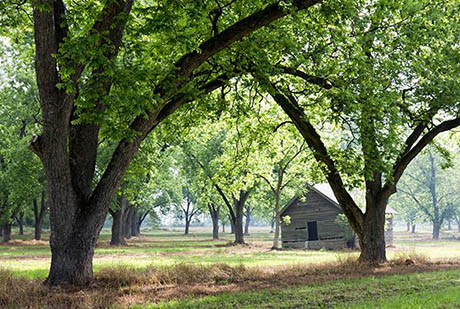For an 8-year-old, it seemed like a lot of work, but I didn’t mind, because it seemed important.
My father and I left Meridian, Miss., early one morning on a mission to plant pecan trees. My father’s job kept transferring us to different places — Meridian was the fifth city where Southern Railway had sent him — but planting the trees held the promise of something more permanent.
I don’t remember how many trees we planted that day, but it seems as though there were around a dozen. We were planting them on land which we had inherited after my mother’s father had died. He had owned a farm in the country — where my mother had spent her summers when she was younger — and we now owned part of that property after it had been divided between his three children.
My father’s plan was for us to move there one day. We were planting trees for what would be our future home.
“These little trees will take 15 or 20 years to grow big and produce pecans,” my father told me. “If we take care of these trees now, they’ll be growing pecans for a hundred years or more. Your grandchildren might be able to eat pecans that grow on these trees after you and I are dead.”
I had little ability to appreciate such a long view of time back then, but I do now. Even at the time, I found it strangely exciting to think that these trees would live far longer than I would. That seemed forever.
We never moved to that farm in Cherokee County, Ala. Within a year or so, my parents would be divorced. The land was sold and the farm was just a footnote in my childhood.
But even now, I stop sometimes and wonder who gets to eat the pecans produced by those beautiful trees which I helped plant so long ago.
I’ve been thinking about that trip this week — and the trees which have grown as a result — because I’m uneasy about seeing our society move toward shorter and shorter attention spans.
When we build things, it’s for the short term. A house or commercial building that we construct today probably won’t be there in a hundred years, certainly not in a couple of hundred years. Much of our commercial real estate is cheaply slapped together to last for a decade or so, especially for retail use. Then it’s obsolete, so it’s bulldozed and something else cheap replaces it — or it turns into a run-down shopping center that’s first filled with sleazy title pawn shops and liquor stores and then eventually abandoned.
I see new construction going on all around me, but I see decaying or abandoned stores nearby. We worship the new and shiny, but because we don’t build things to last, those things soon fall apart and something else becomes the hot new location.
Something about this strikes me as terribly unsustainable. It strikes me as wasteful. Worst of all, it strikes me as the result of short-term thinking that leaves us with dizzying change — and little way of feeling grounded in something that will last.
How many people do you know who live in a family home that’s been around for a few generations? I can’t think of anybody. That used to be common. Houses were built to last and families had a place to return to — at least for visits. There was a sense of solidity that seems to have changed.
What if we stopped thinking in such short-term ways? What if we thought more about planting trees that would produce pecans for other people long after we were dead?
What if we stopped buying houses that would become dilapidated and shoddy after 50 years? What if we built homes that were so solid and so strong that many generations of a family might want to stay here and call it home?
I don’t believe I can change the world in my lifetime. I don’t think anybody can do that. But I believe that a family with vision — that set its priorities and values toward the future — could change the world over the centuries.
What if a family made decisions for the long term — in the things it built, the money it invested, the values it taught to its children — so that they could change the world? What could that sort of investment make in a few hundred years? How much influence and wealth would that family have in a thousand years?
I wonder who’s eating those pecans from the trees I helped plant years ago on a farm near Piedmont, Ala. I’ll never meet those people. They’ll never know who planted the trees. But those trees are a perfect symbol of how we can create things that are going to last.
I want to create something that can bring positive change to the world long after I’m dead and gone. That’s a lot more exciting than just wasting my efforts on short-term consumption.
I’d like to create a family that changes the world — even though I’ll never live to see the fruit they will bring to the world. That’s a vision worth living for.

 ‘This path leads to somewhere I think I can finally say, I’m home’
‘This path leads to somewhere I think I can finally say, I’m home’ Economic Man needs no heart, because love and God are dead
Economic Man needs no heart, because love and God are dead Leave your dead past behind; that’s not where you’re going
Leave your dead past behind; that’s not where you’re going